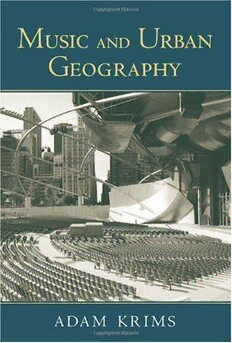
Music and Urban Geography PDF
248 Pages·2007·3.164 MB·English
Most books are stored in the elastic cloud where traffic is expensive. For this reason, we have a limit on daily download.
Preview Music and Urban Geography
Description:
"Music and Urban Geography" is the first book to theorize musical aspects of the tremendous changes that have overtaken major cities in the developed world over the past few decades. Drawing on musicology, music theory, urban geography, and historical materialism, Krims maps changes not only in how music represents cities, but also in how music sounds and is deployed socially in new urban contexts. Taking on venerable musicological debates from entirely new perspectives, Krims argues that the cultural-studies approach now predominant in cultural musicology fails to address contemporary realities of production and consumption; instead, the social effects of space and new patterns of urban production play a shaping role, in which music takes on new forms and functions, with representation playing a significant but not always decisive role. While music scholars increasingly concern themselves with place, Krims theorizes it together with the shaping role of space. Pushing urban geography into new cultural contexts "Music and Urban Geography" will offer those concerned with the social effects of space new theoretical models. Ranging from Anonymous 4 to Alanis Morissette, from Curacao to Seattle, "Music and Urban Geography" presents a truly wide-ranging, interdisciplinary, and theoretically ambitious view of both musical and urban change."....Krims has written a truly pioneering work, sure to provide the foundational text for any further musicological engagement of the topic... Krims's work provides an exemplary model in interdisciplinary study, one that should continue to inform any scholar who takes an interest in music as a concrete cultural expression, and it is indeed the type of study that should inspire and inform new scholarship in the field." -- Notes"...[F]for those hoping to formulate a post-cultural studies approach to the study of music and urbanism, this may be one of the best starting points so far. This book offers valuable insight for anyone grappling with the legacies of Adorno, Marx and a host of other contemporary scholars of music. Any ethnomusicologist examining music in an urban environment will find this a challenging and inspiring work." -- Pacific Review of Ethnomusicology
See more
The list of books you might like
Most books are stored in the elastic cloud where traffic is expensive. For this reason, we have a limit on daily download.
